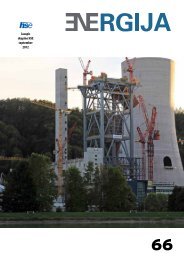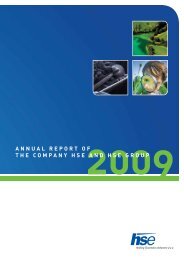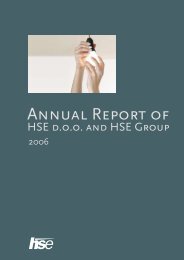Annual report - HSE
Annual report - HSE
Annual report - HSE
You also want an ePaper? Increase the reach of your titles
YUMPU automatically turns print PDFs into web optimized ePapers that Google loves.
Continental Europe<br />
After a sudden increase in electricity supply prices for one year ahead due to disaster<br />
in Japan and subsequent decision to shut down eight German NPPs in March 2011, the<br />
number of long-term contracts on electricity supply decreased throughout 2012, dragging<br />
along the European debt and economic crisis. Relatively high prices of raw materials and<br />
energy products and lower euro value, compared to dollar, had no success in increasing<br />
the electricity supply prices in the coming year, as the significantly larger production<br />
electricity in solar and wind power plants had a major impact on the supply prices under<br />
long-term contracts. On the basis of the embargo on import of Iranian oil to Europe<br />
due to nuclear issues, concerns over potential interruptions in oil supply due to war in<br />
Syria and later in Palestine, the oil prices were at high levels throughout 2012. Coal prices<br />
on international markets fell in negative trends in the second half of the year, affecting<br />
the value of long-term electricity supply contracts. Shutdowns of industrial facilities<br />
contribute to lower emission levels and, consequently, to decreased demand for emission<br />
coupons. The market highly depends on political decisions of the EU leaders, who still<br />
have not reached an agreement on keeping/withdrawing a portion of coupons in/from<br />
the European trading scheme. In 2013, we transit to a new period of emissions trading that<br />
requires all electricity producers to cover their emissions entirely. Due to intensifying debt<br />
crisis in Europe, a question arose, whether week European economy is capable of handling<br />
the financial burden of emission coupons purchase. And the uncertainty regarding longterm<br />
requirements in the area of CO 2<br />
emissions limitation is one of the main factors in the<br />
drop of investments in new production capacities of the Continental Europe. AS a matter<br />
of fact, every investor needs a clear price signal that will allow them better prediction of<br />
future cash flows and easier closing of investment financial construction.<br />
The market of Continental Europe represents the market in which we generate a large<br />
part of our turnover that we managed to increase in 2012, despite severe conditions. This<br />
market is exploited particularly due to high liquidity for price risk management in trading<br />
in other regional markets.<br />
In 2012, we exploited the Czech electricity market mostly for purchases of electricity,<br />
which we later sold to the German and Hungarian market. Market coupling was one of<br />
the activities to balance the electricity price on the day-ahead market level on the Czech<br />
and Slovakian market, which in 2012 were joined by the Hungarian market. In the Czech<br />
Republic we trade with short-term and long-term electricity supply contracts, while in<br />
Slovakia we trade solely on daily level due to poor liquidity of long-term contracts.<br />
<strong>Annual</strong> Report <strong>HSE</strong> 2012<br />
2 Business Report<br />
57
















